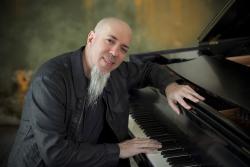- Music
- About
- Degree Requirements
- Class Schedule
- Composition and Theory
- History and Culture
- Music Technology
- Performance
- Edward and Joyce Linde Music Building
- Theater Arts
- News
- Events
- People
- View/Listen
- Space/Resources
- Give


Join us for an epic masterclass with Jordan Rudess exploring composition, improvisation, and student performances of Jordan's work.
Voted “Best Keyboardist of All Time” by Music Radar Magazine, Jordan Rudess is best known as the keyboardist/multi-instrumentalist extraordinaire for platinum-selling Grammy Award–winning rock band, Dream Theater. As a Visiting Artist with the MIT Center for Art, Science & Technology (CAST), he is collaborating with Professor Joe Paradiso and the Media Lab Responsive Environments Group to create new technology that probes the boundaries of where AI meets musical control and expression. A classical prodigy who began his studies at the Juilliard School at the age of 9, his music is a unique blend of classical and rock influences. In addition to playing in Dream Theater and his solo career, Rudess has worked with a wide range of artists, including Deep Purple, David Bowie, Steven Wilson, Jan Hammer, Enrique Iglesias, the Paul Winter Consort, Annie Haslam, Liquid Tension Experiment (with John Petrucci, Mike Portnoy, and Tony Levin), LMR (with Tony Levin and Marco Minneman), Blackfield, Aviv Geffen, the Dixie Dregs, Rod Morgenstein, and Tony Williams among others.
His interest in state-of-the-art keyboard controllers and music apps is another area of his career in which he has achieved success. Rudess owns the successful app development company Wizdom Music, creators of award-winning apps such as MorphWiz, SampleWiz, and Geo Synthesizer. Wizdom Music’s latest app, GeoShred, was created in collaboration with moForte, founding members of Stanford University’s Sondius team. In addition, Rudess is the author of two keyboard technique books including his latest, Total Keyboard Wizardry: A Technique and Improvisation Workbook. Recently, he was an artist-in-residence at Stanford University’s Center for Computer Research in Music and Acoustics (CCRMA).
The Emerson/Harris Masterclass Series is supported in part by the Robert L. Malster (1956) Fund.